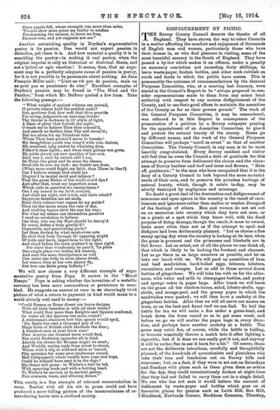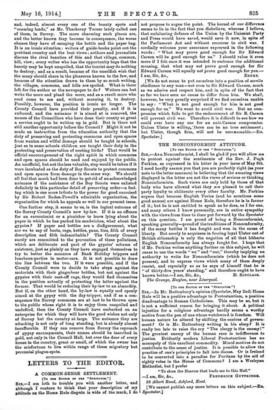DISFIGUREMENT BY PICNIC.
THE Surrey County Council deserve the thanks of all England. They have shown the way to other Councils in a matter affecting the comfort and enjoyment of thousands of English men and women, particularly those who have their homes in, or who find pleasure in visiting, some of the most beautiful scenery in the South of England. They have passed a by-law which makes it an offence, under a penalty on summary conviction not exceeding forty shillings, to leave waste-paper, broken bottles, and other such rubbish on roads and lands to which the public have access. This is presumably the outcome of recommendations by the General Purposes Committee, who, at a meeting last January, were stated in the Council's Report to be "always prepared to con- sider representations made to them from any minor local authority with respect to any Redone disfigurement of the County, and to use their good offices to maintain the amenities of the County as far as their powers permit." The work of the General Purposes Committee, it may be remembered, was referred to in this Report in consequence of the presentation of a petition by a Surrey ratepayer praying for the appointment of an Amenities Committee, to guard and protect the natural beauty of the county. Roses go by different names, and the work of the General Purposes Committee will perhaps "smell as sweet" as that of another Committee. The County Council, in any case, is to be most heartily congratulated. Every Surrey resident and visitor will feel that he owes the Council a debt of gratitude for this attempt to preserve from defilement the charm and the clean. nese of Surrey heather and turf and trees and flowers. " Hats off, gentlemen !" to the men who have recognized that it is the duty of a County Council to look beyond the mere material needs of their area, and to preserve the priceless heritage of natural beauty, which, though it exists to-day, may be utterly destroyed by negligence and misusage.
No doubt a great deal of the destruction and disfigurement of commons and open spaces in the country is the result of care- lessness and ignorance rather than malice or wanton disregard of the feelings of others. Men and women do not set out on an excursion into country which they have not seen, or on a picnic at a spot which they know well, with the fixed purpose of doing damage, though the result, it must he owned, looks more often than not as if the attempt to spoil and disfigure had been deliberately planned. "Let us choose a fine sunny spring day when the country is looking at its best, when the grass is greenest and the primroses and bluebells are in full flower. Let us select, out of all the places we can think of, that which is likely to be looking the freshest and cleanest.. Let us go there in as large numbers as possible, and let us take our lunch with us. We will pack up quantities of ham and beef sandwiches, hard-boiled eggs, lettuces, lobsters, cucumbers, and oranges. Let us add to these several dozen bottles of gingerbeer. We will take tea with us for the after- noon, with water and milk in champagne-bottles, and pastry and sponge cakes in paper bags. After lunch we will leave on the grass all the chicken-bones, salad, lobster-shells, egg- shells, and orange-peel, and the greasy paper in which the sandwiches were packed; we will then have a cockshy at the gingerbeer bottles. After that we will all carve our names on trees, or on the best and. finest turf we can find. To boil the kettle for tea we will make a fire under a gorse-bush, and break down the trees round so as to get some wood, and before we go we will scatter the paper bags in every direc. Hon, and perhaps have another cocksty at a bottle. The gorse may catch fire, of course, while the kettle is boiling, or because somebody throws a match into it after lighting a cigarette; but if it does we can easily put it out, and anyway it will be rather fun to see it burn for a bit." Of course, those are not the deliberate intentions, carefully and thoughtfully planned, of the hundreds of excursionists and picnickers who take their teas and luncheons out on Surrey hills and commons; but, as a fact, if they were to set out on Saturdays and Sundays with plans such as these given them as orders for the day, they could conscientiously declare at night-time that they had not failed to carry them out in a single detail. No one who has not seen it would believe the amount of defilement by waste-paper and bottles which goes on at favourite places for picnics such as Leith Hill, Box Hill, Hindhead, Newlands Corner, Bookham Common, Thursley, and, indeed, almost every one of the beauty spots and "roaming lands," as Mr. Thackeray Turner lately called one of them, in Surrey. The more charming such places are, and the better known they become in consequence, the worse chance they have of escaping the bottle and the paper bag. It is an ironic situation : writers of guide-books point out the prettiest country and the best views ; anthers and journalists discuss the rival beauties of this and that village, common, bill, view ; every writer who has the opportunity begs that the beauty may be kept unspoiled, that the tourist may do nothing to destroy; and as a result, because of the unselfish wish that the many should share in the pleasures known to the few, and because of the attention drawn to them by so much writing, the villages, commons, and hills are spoiled. What is there left for the author or the newspaper to do P Writers can but write the more and plead the more, and as a result more who read come to see and, without meaning it, to destroy. Possibly, however, the position is ironic no longer. The County Council have provided their penalty, and if it is enforced, and the nuisance it is aimed at is removed, the names of the Councillors who have done their county so great a service ought to be written up in gold. But is there not still another opportunity before the Council P Might it not be made an instruction from the education authority that the duty of preserving and protecting commons and open spaces from wanton and wilful damage should be taught in schools, just as in some schools children are taught their duty in the protecting and preservation of nesting birds? That would be official encouragement of the right spirit in which commons and open spaces should be used and enjoyed by the public. An unofficial, but not the less valuable, step would be taken if it were inculcated as the duty of Boy Scouts to protect commons and open spaces from damage in the same way. We should all feel that much had been done to get rid of an acknowledged nuisance if the assistance of the Boy Scouts were enlisted definitely in this particular detail of preserving order—a feel- ing which is one more tribute to the power for good exercised by Sir Robert Baden-Powell's admirable organization, the organization for which he appeals so well in our present issue.
One further step, it seems to us, is the logical outcome of the Surrey County Council's new by-law. If it is an offence for an excursionist or a picnicker to leave lying about the paper in which he has packed his sandwiches, what about the gypsies P If paper and bottles are a disfigurement, what are we to say of boots, rags, kettles, pane, tins, filth of every description and filth indescribable P The County Council surely are committed to the prevention of these pollutions, which are deliberate and part of the gypsies' scheme of existence, just as plainly as they have engaged themselves to try to better the manners of Bank Holiday trippers and luncheon-parties in motor-cars. It is not possible to draw the line between the two. If it were possible, and if the County Council were to decide to take steps against the motorists with their gingerbeer bottles, but not against the gypsies with their cast-off rags, they would find themselves in the position actually of protecting the latter against the former. That would be reducing their by-law to an absurdity. But if, on the other hand, the by-law is equally and openly aimed at the gypsy with the day-tripper, and if as a con- sequence the Surrey commons are at last to be thrown open to the public whose right it is to enjoy them unspoiled and undefiled, then the County Council have embarked on an enterprise for which they will have the good wishes not only of Surrey but the country at large. The nuisance they are attacking is not only of long standing, but is already almost insufferable. If they can remove from Surrey the reproach of gypsy encampments, their names should be inscribed in gold, not only in the Council Hall, but over the door of every house in the country, great or small, of which the owner has the misfortune to live within range of these migratory but perennial plagueepots.











































 Previous page
Previous page